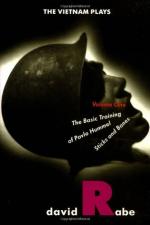|
This section contains 330 words (approx. 1 page at 400 words per page) |

|
The Basic Training of Pavlo Hummel Summary & Study Guide Description
The Basic Training of Pavlo Hummel Summary & Study Guide includes comprehensive information and analysis to help you understand the book. This study guide contains the following sections:
This detailed literature summary also contains Bibliography and a Free Quiz on The Basic Training of Pavlo Hummel by David Rabe.
David Rabe's The Basic Training of Pavlo Hummel was the first American play of stature to deal with the experience of the Vietnam War. At least one historian of the Vietnam era, Philip Beidler writing in American Literature and the Experience of Vietnam, found that Rabe made "the most important contributions to the dramatic literature of Vietnam during the period 1970-75." After being rejected by numerous regional and experimental theaters, the play was first produced professionally in 1971 at the Public Theatre by Joseph Papp's New York Shakespeare Festival, one of the country's most prestigious production organizations. Rabe's professional debut was a success: Pavlo Hummel enjoyed a run of 363 performances and received predominantly enthusiastic critical response. Clive Barnes of the New York Times acclaimed Rabe as a "new and authentic voice of our theatre." For this play, Rabe received the Village Voice's Obie Award for distinguished playwriting, and a Drama Desk Award for most promising playwright.
From trying to keep a journal during his military service in Vietnam, Rabe found that bis experience there defied description, exceeding the capabilities of "language as mere symbol," as he wrote in his introduction to Two Plays: The Basic Training of Pavlo Hummel and Sticks and Bones. Unwilling to bring his "full sensibility to bear upon all elements" of the experience, Rabe "skimmed over things and hoped they would skim over me." In Rabe's depiction, the Vietnam experience is a "surreal carnival of death," reflected in Pavlo's extremely confused state of mind, and in the mood of expressionism throughout the play. The Basic Training of Pavlo Hummel is not strictly an anti-war play; its author believes that war is inevitably a part of what he calls the "eternal human pageant." Instead, Rabe examines the process of basic training as an American rite of passage, using his metaphor to illustrate the coercive power of the institution. Rabe himself called military basic training a metaphor for the "essential" training by which society reshapes all individuals.
Read more from the Study Guide
|
This section contains 330 words (approx. 1 page at 400 words per page) |

|



